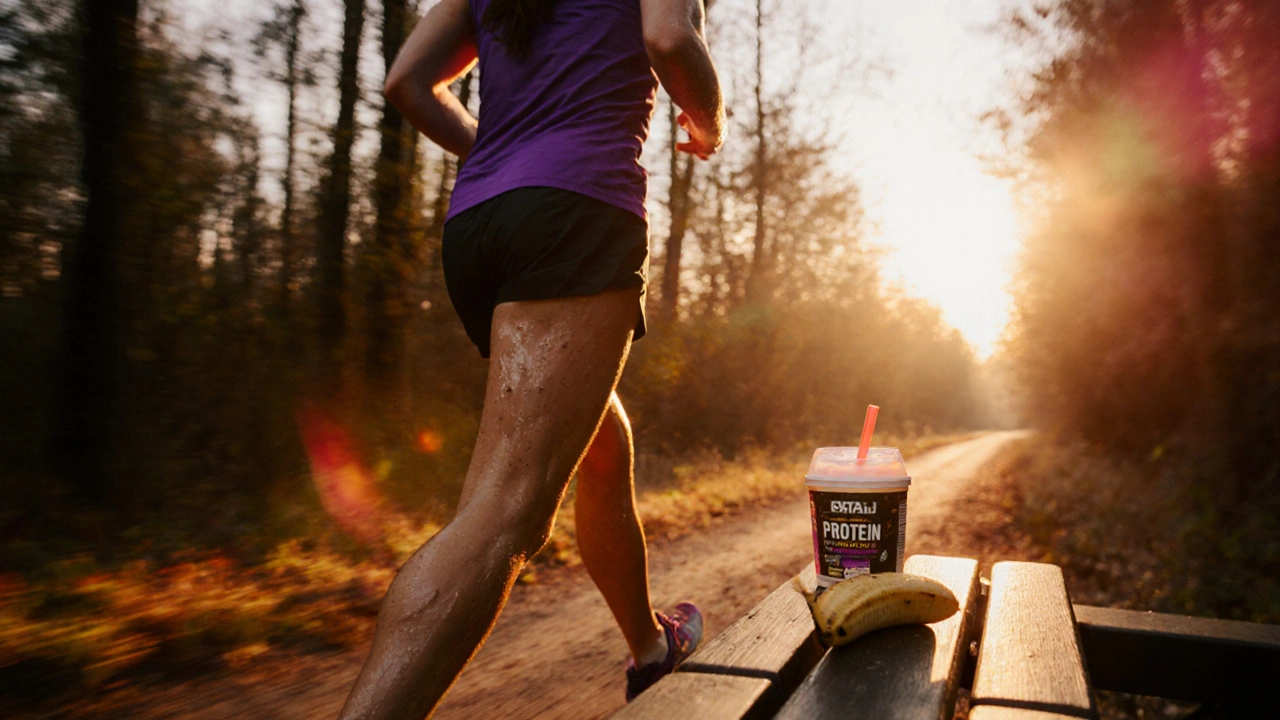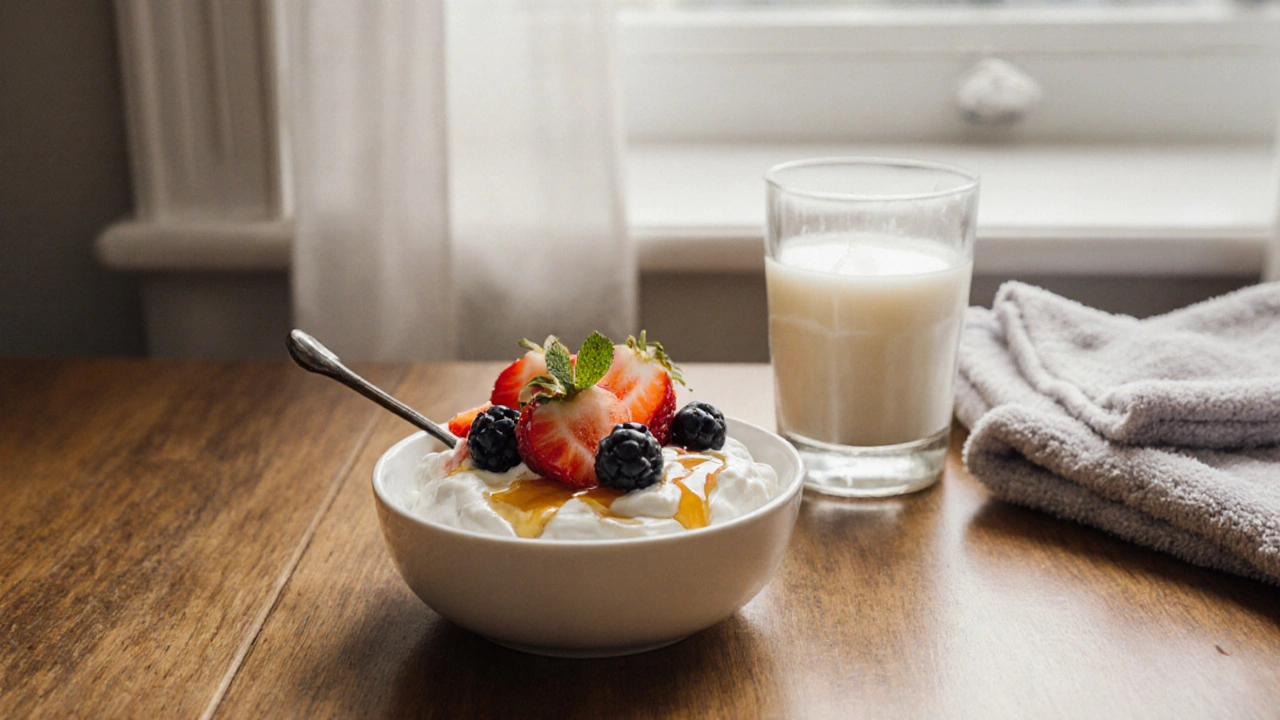Should I Eat Before or After a Workout? The Simple Truth That Actually Matters

You’ve just finished a tough session. Your legs are heavy, your shirt’s soaked, and your stomach’s growling. Or maybe you’re standing in the kitchen before your run, wondering if you should grab a banana or wait until you’re done. The question isn’t just about hunger-it’s about performance, recovery, and whether you’re wasting your effort.
What happens when you work out on an empty stomach?
Some people swear by fasted cardio. They say it burns more fat. And yes, technically, your body will tap into stored fat for energy if you haven’t eaten in 8-12 hours. But here’s the catch: that doesn’t mean you’re losing more body fat overall. Studies from the Journal of the International Society of Sports Nutrition show that while fasted exercise increases fat oxidation during the session, total fat loss over time is no different than eating beforehand.
What you do lose is performance. Without fuel, your muscles don’t have enough glycogen to push hard. That means slower sprints, lighter lifts, and less endurance. If your goal is strength, muscle gain, or even just finishing your workout without feeling like you’re dragging a sack of bricks, skipping food before you exercise is a bad trade-off.
Try this: if you’re doing a 45-minute run or a strength session, and you haven’t eaten since last night, your body is running on fumes. You might feel fine at first-but around minute 20, you’ll start to lag. Your form slips. Your motivation drops. That’s not discipline. That’s your body begging for fuel.
What should you eat before a workout?
You don’t need a full meal. You need something light, easy to digest, and packed with quick energy. Aim for 15-30 grams of carbohydrates with a tiny bit of protein, 30 to 90 minutes before you start.
Good options:
- A banana with a tablespoon of peanut butter
- Half a cup of oatmeal with a splash of milk
- Two rice cakes with honey
- A small apple with a few almonds
- A slice of whole grain toast with jam
These give you glucose to power your muscles without weighing you down. Avoid high-fat or high-fiber foods right before you move-things like avocado toast, beans, or a big smoothie with spinach and chia seeds can cause stomach upset during exercise.
Timing matters too. If you eat 90 minutes before, your body has time to digest. If you’re eating 20 minutes before, keep it under 150 calories. No one wants to stop mid-squat because their stomach’s doing somersaults.
Why eating after a workout isn’t optional
Here’s the truth: if you don’t eat after you train, you’re not just missing out on recovery-you’re sabotaging it.
During exercise, your muscles break down glycogen and tiny bits of muscle tissue. Afterward, your body needs protein to rebuild and carbs to refill those energy stores. Skip this window, and you’ll feel sluggish the next day. Your muscles won’t recover properly. You might even lose muscle over time if you’re consistently training hard without refueling.
Research from the American College of Sports Medicine says the ideal time to eat after a workout is within 30 to 60 minutes. That’s your metabolic sweet spot. Your muscles are like sponges, soaking up nutrients faster than at any other time.
What should you eat? A mix of protein and carbs. Around 20-30 grams of protein and 30-60 grams of carbs. That’s not a giant plate-it’s a simple meal.
Examples:
- Greek yogurt with berries and a drizzle of honey
- A protein shake with a banana
- Cottage cheese with pineapple
- Grilled chicken with sweet potato
- Eggs on whole grain toast
You don’t need fancy supplements. You don’t need a post-workout shake with 50 ingredients. Just food. Real food. Something you’d eat anyway.

What if you’re trying to lose weight?
This is where things get messy. People think skipping meals before or after a workout will help them burn more fat. But here’s the reality: weight loss comes down to calories over time-not whether you ate before your treadmill session.
If you skip food before your workout and then end up exhausted, you might cut your session short. That means fewer calories burned. If you skip food after and your body stays in breakdown mode, you might lose muscle instead of fat. And losing muscle slows your metabolism. That makes losing weight harder in the long run.
One 2023 study from the University of Bath tracked 20 people doing the same workout routine for 8 weeks. One group ate before and after training. The other skipped pre-workout food and only ate dinner later. Both groups lost the same amount of weight. But the group that ate around their workouts kept more muscle and had better energy levels. They were also more consistent with their training.
Consistency beats extremes. If you’re hungry, eat. If you’re not, don’t force it. But don’t pretend fasting makes you leaner-it just makes you tired.
What about morning workouts?
Morning sessions are the hardest to plan. You’re groggy. Your stomach’s empty. And you’re rushing out the door.
If you’ve got 20 minutes, have a small snack. A piece of toast, a handful of grapes, a protein bar. Even 100 calories can make a difference.
If you truly can’t eat anything, don’t panic. Just keep your workout moderate. Go for a brisk walk, do bodyweight circuits, or lift light weights. Don’t try to smash a heavy squat session on an empty stomach. You’ll risk injury and burnout.
And always, always eat after. Even if you didn’t eat before. Your body still needs to recover. A glass of milk and a banana after your morning run? Perfect.

What if you’re doing endurance training?
If you’re training for a 10K, a marathon, or a long bike ride, your needs change. You need more fuel, more often.
For workouts longer than 90 minutes, you should eat a small meal 2-3 hours before. Something like oatmeal with fruit, or a bagel with peanut butter. Then, during the session, you might need to top up with energy gels, a banana, or sports drink every 45 minutes.
Afterward, your recovery meal should be bigger. Aim for 1.2 grams of carbs per kilogram of body weight and 0.3 grams of protein per kilogram within the first hour. That’s about 70g carbs and 20g protein for a 70kg person.
Don’t wait until you’re starving. By then, you’ve already missed the window for optimal recovery.
Bottom line: eat around your workout, not around your schedule
The best time to eat isn’t dictated by the clock. It’s dictated by your body’s needs.
Before a workout? Eat something light if you’re hungry. Skip it if you’re not, but don’t push yourself too hard.
After a workout? Eat within an hour. Protein and carbs. Simple. Real. Enough to repair and refill.
You don’t need to overthink it. You don’t need to follow a strict 30-minute window every single time. Life happens. Sometimes you train after dinner. Sometimes you skip breakfast before a run. That’s okay.
The goal isn’t perfection. It’s consistency. Show up. Fuel smart. Recover well. That’s how you get stronger, faster, and more energized-not by fasting, not by timing meals to the minute, but by listening to your body and giving it what it actually needs.
